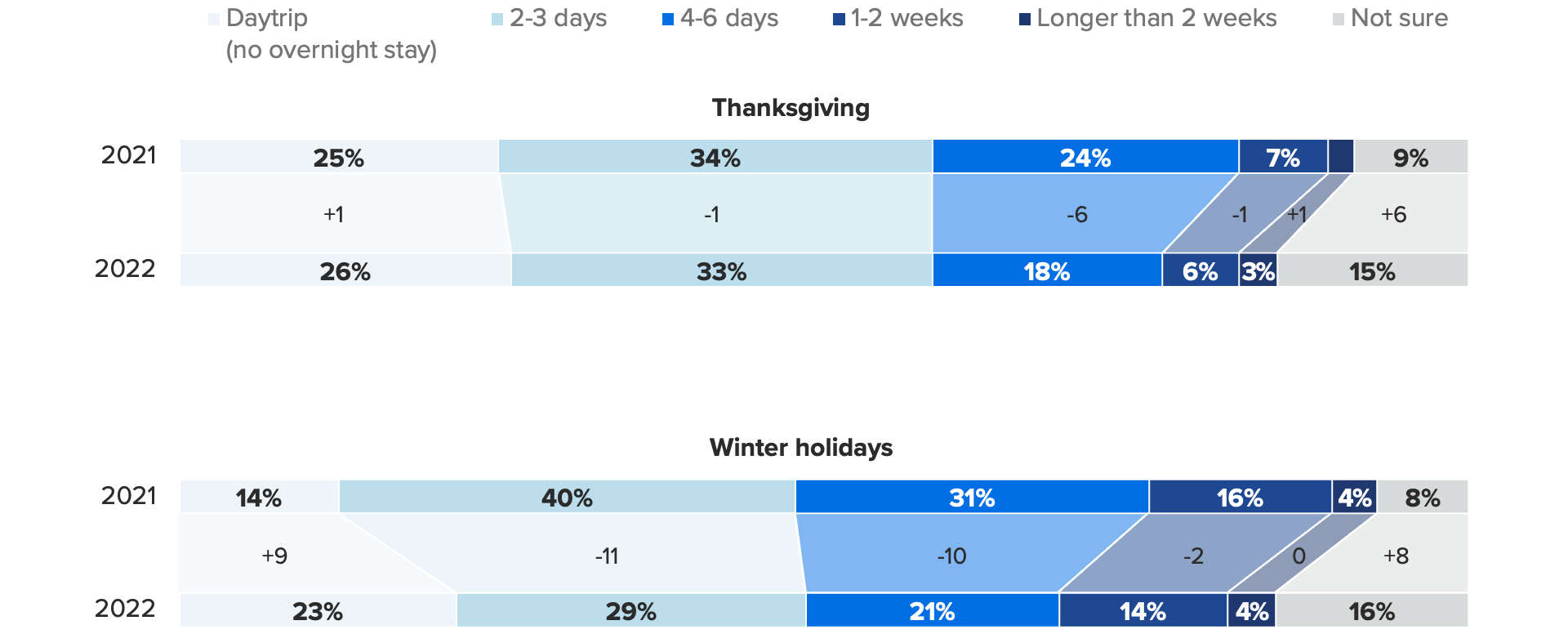Holiday Travelers Stick Close to Home, Hunt for Deals Amid High Inflation

Faced with ongoing inflationary concerns and higher-than-normal travel prices, Americans will pursue multiple strategies including staying with friends and family, shortening trips, and dipping into rewards points reserves to offset high costs this holiday season.
This is part of Morning Consult’s First Look: Consumers’ 2022 Holiday Plans report, which provides an early analysis of the consumer trends that brands should anticipate ahead of the holiday season across the finance, retail, travel and food industries.
Download the First Look: Consumers’ 2022 Holiday Plans report here.
After two years of small Thanksgiving dinners, socially distant gift exchanges and canceled trips, Americans are looking forward to returning to pre-pandemic travel behaviors over the 2022 holiday season.
The share of adults who say they will definitely travel this year compared with last year is equal for Thanksgiving and slightly higher for the winter holidays (just over 1 in 5 for both). However, this doesn’t account for those who are unsure, representing 12% of U.S. adults for Thanksgiving and 16% for the winter holidays. If any of these adults indeed decide to travel, as some likely will, the numbers will surpass 2021 and possibly even top volume from the years before COVID-19.
The trips will not be completely worry-free, though the cause of that worry has shifted from the pandemic to price. Only a quarter of Americans are concerned about the coronavirus outbreak, down from 45% at this time last year and 53% at the same time in 2020. But now, nearly half of U.S. adults say they’re at least somewhat concerned about the impact of inflation on air travel, and almost three-quarters say the same about car travel. With inflation showing no signs of cooling, it will be a cost-crunching holiday season for travelers, who will employ a wide range of strategies including shortening trips, staying with friends and family, and leveraging points and rewards to offset high costs.
Staying with friends and family will help travelers save on trip expenses
The end of the year is typically an expensive time for consumers, as costs related to gifts, groceries and all the holiday trimmings add up quickly. This year, wallets will be stretched further by high inflation, and as a result 3 in 5 of those with Thanksgiving travel plans said they don’t plan to spend anything on accommodation, nearly identical to those who said the same for winter holiday travel (58%).
To achieve this, many travelers will stay with friends and family — an arrangement they were more likely to avoid in the last two years given concerns about the spread of COVID-19. Among travelers with overnight trips planned, 78% said they will stay with friends and family this Thanksgiving, and 75% said they will do so over the winter holidays.
In comparison, fewer holiday travelers plan to stay at paid accommodations, and those that do favor hotels — particularly chain hotels — over short-term vacation rentals, although millennials are far more likely to seek out an Airbnb or Vrbo than their older counterparts. When travelers do pay for accommodation, price is their primary consideration.
Brands in the accommodation category should account for this behavior when planning their holiday messaging. People are ready and willing to get away from home for the holidays, but their frugality may lead them to second-guess plans. Companies can entice them to take their long-planned trips by highlighting deals and discounts during key holiday travel windows.
Travelers will cut back on the distance and duration of their trips
In theory, waning COVID-19 concerns may make travelers more comfortable taking shared transportation like planes, trains and buses this year, but these tailwinds will also be slowed by cost concerns. This is particularly true over this year’s winter holiday period. The shares who said they anticipate traveling by plane and by rental car are both down 11 percentage points from 2021.
This trend tracks with travelers’ tendency to shorten the duration of their winter holiday trips this year, likely also a cost-saving measure. While 14% of travelers said they’d only be taking a daytrip with no overnight stay over the winter holidays in 2021, 23% say the same this year.

Shorter, closer-to-home trips should raise flags for airlines as well as hotels and vacation rental companies: Even if travel volume is high, it may not result in a surge in paid bookings. Companies that cater to road-trippers, on the other hand, should be prepared for increased patronage.
Price sensitivity will drive more travelers to utilize points or rewards to make bookings
Another tactic travelers will rely on to help save money is leveraging their saved-up points and rewards from credit cards and loyalty programs. Compared with last year, a higher share of travelers say they’ll dip into their points reserves when booking transportation or accommodation during the 2022 holiday season, in line with broader trends related to inflation.
Travelers are more likely to use points from a specific brand than to leverage a generic travel program, and are more apt to allocate their points for accommodation during Thanksgiving and for airfare during the winter holidays, likely due to limited flexibility with travel dates over the Thanksgiving window.
Points and rewards redemption will be driven by high-income consumers and millennials, who are generally the most likely groups to be active users of travel credit cards, and who will be especially attuned to redemption deals and offers through the holiday season. Travel brands should leverage their loyalty program channels to reach these customers early and often, enticing them to book holiday travel.
Download the First Look: Consumers’ 2022 Holiday Plans report here. Morning Consult will continue to track consumer behavior throughout the holidays. To get the latest intelligence to inform your decision making, subscribe to Our Best Intel, a daily briefing on the most important data, charts and insights from the Morning Consult team.
Lindsey Roeschke is an analyst whose work focuses on behavior and expectations of consumers in the travel & hospitality and food & beverage categories, particularly through a generational and cultural lens. Prior to joining Morning Consult, she served as a director of consumer and culture analysis at Gartner. In addition to her research and advisory background, Lindsey has more than a decade of experience in the advertising world. She has lived and worked in seven cities across four continents.